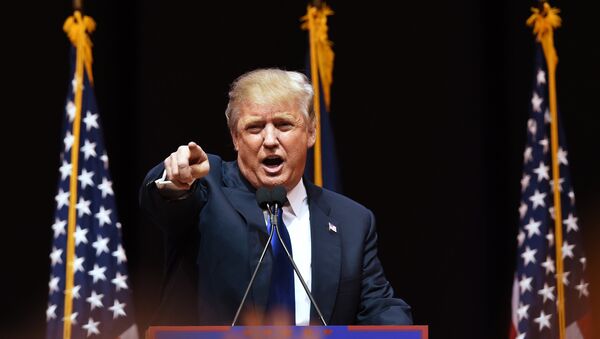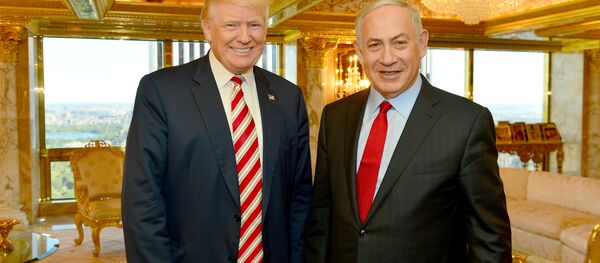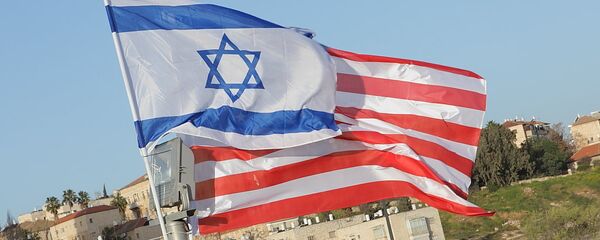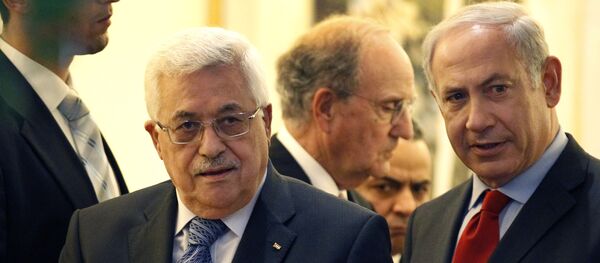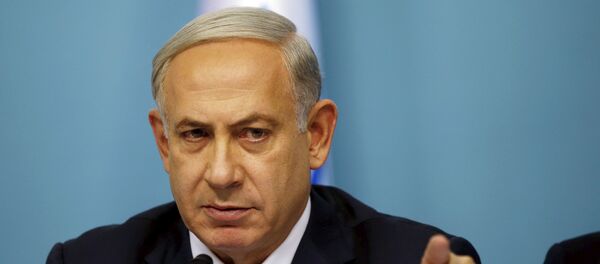Zeev Hanin, a professor at the Bar-Ilan University in Israel, believes that Trump’s administration would be a strict adherent of what earlier called the A.B.C — Anything But Clinton — approach by former US President Gorge W. Bush, which in the case of Trump would be A.B.O – Anything But Obama – way when dealing with Israel.
"Trump will be leaning towards Bush’s policy that somebody once defined as ‘Anything But Clinton.’ I believe it will be ‘Anything But Obama.’ We will see that in half a year," he told Sputnik pointing, however, that major changes are likely to come during his second term if he reelected.
Ksenia Svetlova, an opposition member of the Israeli parliament, Knesset, also doubts that during his first year Trump will pursue independent foreign policy. "At this point, no one can say what would be his steps in the Middle East or global politics, because he wasn’t holding any positions in the US administration before," she told Sputnik.
Therefore, according to the experts, it makes more sense to look at the platform from the Republican Party that was presented on the Republican convention before the elections, rather than at Trump’s political declarations.
FIRST THING FIRST – MOVING US EMBASSY TO JERUSALEM
Trump was not the first and, may be, will not be the last president who during his election campaign promised to move the US Embassy from Tel Aviv to Jerusalem, the experts told Sputnik.
"Trump was not the first US President who promised to move embassy to Jerusalem. There is the US law in this regard. However, the US Congress each time votes for the delay in its implementation," Svetlova said.
In September, Trump told Israeli Prime Minister Benjamin Netanyahu that under his administration the United States would recognize Jerusalem as the undivided capital of Israel. After Trump’s election victory on Tuesday, Israeli officials publicly called on Trump to follow through on this promise.
Toner explained that since Israel’s founding the US administrations have maintained a consistent policy of recognizing no state as having sovereignty over Jerusalem. Besides, a number of nations believe that Jerusalem’s status should be determined in the course of the Palestinian-Israeli peace talks.
"A pre-election promise is one thing, a real life — is another. There are few obstacles such as international agreements and a reaction to such move of regional powers, which are considered to be US allies, such as the Gulf States and Saudi Arabia. The chance still exists, but it is narrow," Svetlova added.
Hanin, in his turn, linked the move of the US mission to the developments in the Middle East.
"It very much depends on the developments in the Middle East. If Trump’s administration once again shifts its interest towards pro-western Sunni regimes as its major allies in the Middle East, the president will not be in a hurry to make such demonstrative steps as his allies will be very much against it," the expert noted.
He believes that Trump instead will give more authority to the US consulate in the Eastern Jerusalem.
Yakov Kedmi, a retired high-ranking Israeli intelligence official, noted that the move of the embassy can serve as an indicator how far Trump can go in supporting Israel in the Middle East peace settlement with Palestinians.
"The question remains whether Trump will choose not to interfere and not to exert pressure on Israel, opposite of what Obama’s administration did before or whether he will go even further and back Israel up in the UN should European countries propose a resolution against Israel’s settlement policy," Kedmi told Sputnik.
Israel has occupied the West Bank and East Jerusalem since the 1967 Middle East war. Palestinians want those territories along with the Gaza Strip for a state but peace talks have stalled since 2014.
NEUTRAL TO ISRAEL-PALESTINE PROBLEM
Throughout his bid for the Oval Office, Trump promised to give "a shot" and try to broker a peace deal between Israelis and Palestinians.
In a video, published on his website, the president-elect is saying that he wants "to remain as neutral as possible because, if you’re not somewhat neutral, the other side is never going to do it."
"By saying that he is going to be a neutral guy he means that he views as a neutrality a significant improvement over Obama’ administration that has been pro-Palestinian. The declaration that he is going to be neutral is a step forward towards Israel," Hanin said.
Many in Israel believe that Trump will pursue more favorable US policy toward Israel. Svetlova, however, cautioned that his stance on the problem remains unclear due to the controversial statements he had made in a bid for US presidency.
Trump’s surprising US presidential victory last week, led to an upsurge of the right rhetoric in Israel as right-wing politicians tried to use his win calling the idea of a two-state solution with the Palestinians "dead." Israeli Education Minister Naftali Bennett said last week "the era of a Palestinian state is over."
Netanyahu called Sunday on the Israeli cabinet to refrain from comments on Trump's presidency, "allowing the incoming administration to formulate together with us its policy vis-a-vis Israel and the region, through accepted and quiet channels, and not via interviews and statements."
The question remains whether he has an alternative to the "two-state solution" to solve this decades-long dispute.
The outgoing administration of Obama has been highly critical of Israel's settlement policies and supportive of "a two-state solution" in the Middle East. The Palestinians, who see Israeli settlements as a major obstacle to reaching a peace agreement, want them dismantled referring to the international agreements.
On Friday, Palestinian President Mahmoud Abbas reiterated Palestine’s readiness for a peace deal with Israel given compliance with all international agreements and its support to the idea of a Paris-based peace conference, aimed at reviving the reconciliation process. The conference is supposed to be held before the end of the year.
On November 7, Netanyahu ruled out Israel’s participation in the French-led gathering refusing to meet France’s Special Envoy Pierre Vimont, who travelled to the region to meet Israeli and Palestinian officials in a bid to promote the idea of the conference.
On June 3, 2016, an international conference on the Israeli-Palestinian settlement took place in Paris. Both Russia and the United States took part in the event as part of the Middle East Quartet, which also includes the European Union and the United Nations. The sides called on Israel and Palestine to engage in direct negotiations on the basis of the corresponding UN Security Council resolutions.
NO DEAL FOR IRAN MEANS NEW US ARMS FOR ISRAEL
Trump decried the nuclear deal the Obama administration negotiated with Iran saying that Iran "should write us a letter of thank you" for "the stupidest deal of all time." He also stressed that this deal threatens Israel, making him less safe.
Speaking after Trump’s victory speech in New York, Friedman, who was also a co-chair of the president-elect’s Israel Advisory Committee, went even further hinting at the possible removal of the restriction on Israel not to ask the United States for additional money, as stipulated in the military aid deal between countries.
Israel has repeatedly sought financial assistance from the United States to offset Iran’s nuclear capabilities, following the lifting of sanctions against Tehran last July.
